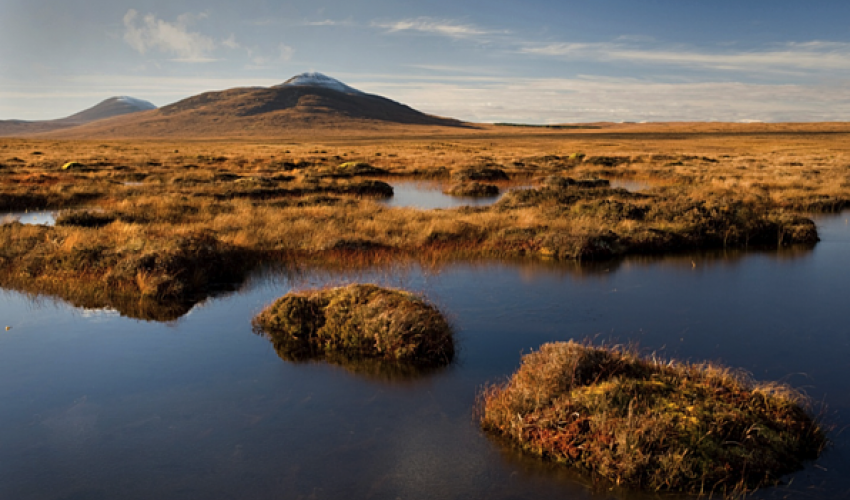Source: iucn.org
Published: April 28, 2014

Photo: RSPB
Europe is rich in peatlands and these important ecosystems can bring environmental, social and economic benefits for communities and wildlife alike. A new report published today highlights innovative projects from around the globe which are helping restore and conserve our threatened peatlands.
Peatlands provide vital natural services in tackling climate change and maintaining our water supply as well as being beautiful havens for wildlife and places for people to enjoy. Peatlands are ancient landscapes in which the naturally wet conditions preserve dead plant material as peat. Carbon dioxide removed from the atmosphere by photosynthesis is effectively ‘locked up’ in the peat for millennia, thereby acting as ‘carbon sinks’ which keep CO2 emissions down in a way even more effectively than rainforests.
Across the globe, peatlands occupy only 3% of the world’s land area, yet hold over 30% of the global carbon store. However, damaged peatlands lose their ability to remove CO2 and instead start to release it back into the atmosphere, thereby accelerating climate change, at a high cost to the environment and society.
The latest publication from the IUCN UK Peatland Programme and CEM Thematic Group on Peatlands, ‘Global Peatland Restoration – Demonstrating Success’, launched today in Brussels, showcases successful restoration projects across the world. Case studies illustrate opportunities for restoration and sustainable management as well as innovative ways of engaging communities in conservation action.
Europe has a crucial part to play, not only in preserving and restoring its own peatlands but also in extending support and knowledge around the world. The EU 2020 Biodiversity Strategy advocates sustainable ecosystem management and the balancing of ecological, economic and social functions of peatlands and other valuable ecosystems. The UK is among the world-leaders in peatland restoration and through the IUCN UK Peatland Programme, a partnership of government and public organisations is working to safeguard healthy peatlands that can bring benefits to society.
Protecting peatlands and the biodiversity that underpins them can support the transformation to a sustainable EU economy. Mapping and assessing ecosystems and their services is essential to ensure that their values can be taken into account in decision-making and integrated in other policy areas. The climate mitigation contribution from CO2 sequestration in wetlands is considerable. Even if drainage of peatlands has largely stopped in the EU, already drained peatlands continue to emit 174 MtCO2 every year, placing the EU second only to Indonesia.
‘These figures demonstrate the important role that the conservation and restoration of peatlands have in climate mitigation efforts. Overall land use emissions should be an essential part of the EU’s climate strategy, paving the way for more ambitious European emission reduction targets,’ says Luc Bas, Director of IUCN’s Brussels office.
Clifton Bain, Director IUCN UK Peatland Programme says. ‘Europe’s peatlands are of major significance in the global challenge to tackle climate change and conserve biodiversity. There are clear benefits to society from conserving and restoring peatlands and great costs if we don’t. We have demonstrated that with the right commitment from government and strong partnerships it is possible to secure peatlands for the future’.
The report launch was co-hosted by the Welsh Government who also share the concern and drive to restore Wales’ peatlands.
‘Peatlands are an important ecosystem and it is imperative that we manage them in a way that ensures the best outcome for our economy, environment and climate. The IUCN has brought together practitioners, scientists and other key players in order to establish a valuable and robust evidence base on peatland management. We in Wales will draw upon this evidence as we progress our ambitious programme of bringing all Welsh peatlands into restoration management within 7 years.’ says Alun Davies AM Minister for Natural Resources and Food.
The full IUCN UK Peatland Programme Global Peatland Restoration – Demonstrating Success booklet is available online.
